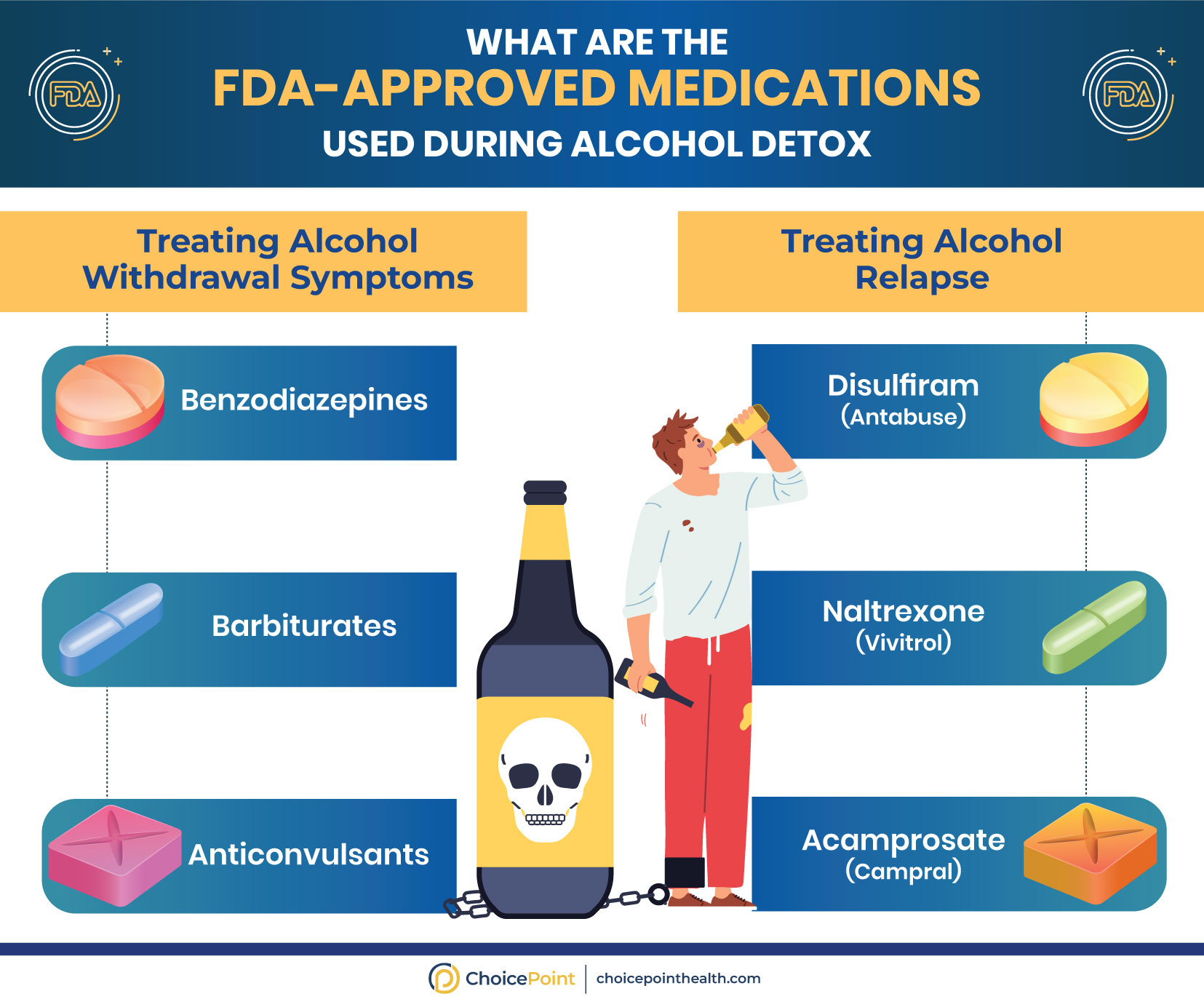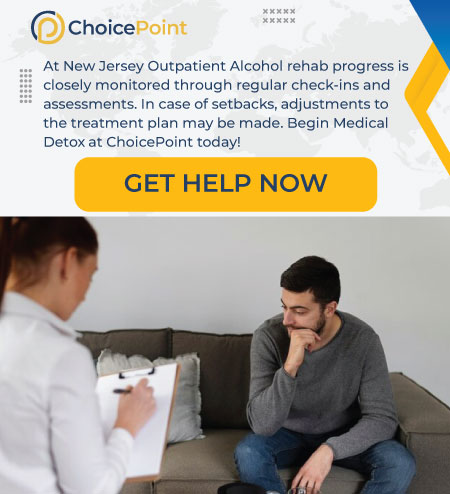Almost 87,745 patients were admitted by detox facilities in New Jersey in 2021, which is a drastic increase over the previous year. Of the different substances behind the cause of admission, alcohol weighed for about 36% of cases. It is scary to think what a harmless single drink can lead a person into. Alcohol addiction is catastrophic and has far-reaching consequences, both emotionally and physically devastating. Alcohol detox programs make recovery realistic by detaching the stigma of impossible recovery. If you are someone who is considering a detox, here is all you should know about the New Jersey outpatient alcohol detox program.
ChoicePoint is a co-occurring addiction rehab that accepts all insurance and offers an outpatient alcohol detox program. Call 844.445.2563 or fill out this form to schedule an appointment.
Table of Contents
Eligibility Criteria at New Jersey Outpatient Alcohol Detox Program
Eligibility for outpatient detox for alcohol in New Jersey is generally determined based on individual factors like:
- person’s health
- the severity of their alcohol dependence
- the appropriateness of outpatient care for their specific situation
Common eligibility criteria may include:
- Undergoing a health assessment to evaluate overall physical health and identify any medical conditions that could impact the detox process.
- A psychological evaluation is to assess the individual’s mental health and determine if outpatient care aligns with their emotional and psychological needs.
- Individuals demonstrating a commitment to participate in the outpatient alcohol detox program actively. This includes attending scheduled sessions and following the prescribed treatment plan.
How Long Does It Take To Detox from Alcohol?
The time it takes to detox from alcohol completely may vary from person to person. Here are some factors that may influence how long it takes to detox from alcohol:
- severity of alcohol dependence
- overall health
- presence of co-occurring conditions
Take a look at the timeline of alcohol detoxification:
- 6-24 Hours: Early symptoms like anxiety and nausea may appear.
- 24-72 Hours: Severe symptoms, including hallucinations, can appear.
- 72 Hours to 7 Days: Acute withdrawal peaks, requiring medical supervision.
- 7 Days Onward: Symptoms gradually subside, but ongoing treatment is crucial for sustained recovery.

Did you know: That as alcohol leaves the body, a person’s symptoms should begin to fade? Most people notice a reduction in symptoms within 5-7 days.

Did you know: That as alcohol leaves the body, a person’s symptoms should begin to fade? Most people notice a reduction in symptoms within 5-7 days.
How Does Outpatient Alcohol Detox Work? 5 Things You Should Know
Patients may work closely with DEA-certified staff when undergoing detoxification at a New Jersey outpatient rehab. At an Outpatient rehab, patients can receive treatment while continuing to live at home. Here’s what a typical timeline entails:
1. Intake Appointment
Your first visit will involve meeting with a doctor, nurse, and counselor to discuss your drinking history and treatment plan. Expect a physical exam, bloodwork, and recommendation for medications to ease withdrawal.
2. Check-Ins and Medication
Over the next days to weeks, you’ll have frequent check-ins and receive prescription medications as needed to manage symptoms.
3. Withdrawal Symptoms
Mild withdrawal symptoms like headache, nausea, anxiety, and trouble sleeping are common early on. The medical team will provide support but let them know if symptoms worsen.
4. Individualized Treatment Plan
A personalized treatment plan is developed based on the assessment findings. This plan outlines the detox process, including any necessary medications, counseling sessions, and support services tailored to the individual’s needs.
5. Counseling & Aftercare
As the process of detoxing from alcohol continues, you’ll start psychotherapy and counseling to understand triggers and build coping strategies. You will also be prepared for sustained recovery through aftercare. The outpatient setting provides medical oversight for detoxing while letting you maintain routines at home.

“Don’t Let the Past Steal Your Present:” Terri Guillemets. Contact us at 844.445.2563, and let’s begin a personalized outpatient alcohol detox program!.

“Don’t Let the Past Steal Your Present:”: Terri Guillemets. Contact us at 844.445.2563, and let’s begin a personalized outpatient alcohol detox program!.
Therapies Used During Detox
A well-balanced combination of medical and psychological treatment is required for detoxing from alcohol. Common therapies patients receive include:
Nutritional Therapy
Alcohol depletes vital nutrients, so IV fluids and vitamin supplements repair chemical imbalances. Proper nutrition also minimizes withdrawal side effects.
Cognitive-behavioral Therapy (CBT)
CBT identifies distorted thought patterns leading to alcohol misuse. You’ll develop coping strategies, thought pattern interventions, and relapse prevention skills.
Dialectical Behavior Therapy Program (DBT)
DBT teaches people how to manage emotions, improve interpersonal relationships, and healthily cope with stress.
Individual & Group Counseling
Through individual and group psychotherapy sessions, therapists help uncover the root causes of addiction. This helps better develop treatment programs for the patients.
Complementary Therapies
Some facilities offer complementary treatments like art therapy, music therapy, yoga, or mindfulness techniques to reduce anxiety and cravings while stabilizing mood. Blended pharmacological and therapeutic therapies provide a holistic treatment, paving the way toward lasting sobriety.

Medication-Assisted Treatment (MAT) for Alcoholism
Types Of Alcohol Detox Medication Used at Outpatient Alcohol Rehab
New Jersey outpatient alcohol detox programs utilize various categories of medicine to manage withdrawal symptoms and cravings when detoxing from alcohol:
Benzodiazepines
Benzodiazepines like Ativan, Librium®, and Valium relieve anxiety, insomnia, and seizures. They also prevent potentially fatal delirium tremens. These medications may be tapered over time. FDA-approved Benzodiazepines include:
- Chlordiazepoxide (Librium®)
- Diazepam (Valium)
- Oxazepam (Serax)
- Clorazepate (Tranxene)
Anticonvulsants
Anticonvulsants such as carbamazepine and gabapentin reduce seizure risks as well as mood instability during the detox process.
Sedative-Hypnotics
Sedative hypnotics like chlordiazepoxide and phenobarbital promote calmness and sleep through central nervous system depression. This helps manage agitation and restlessness.
Other Supportive Medications
Clonidine lowers blood pressure, stress hormones, muscle pains, and cramping. Acamprosate can lessen protracted withdrawal signs like sleep disturbances. Nutritional supplements replenish critical depleted nutrients.
Anti-Craving Medications
Disulfiram and naltrexone (Vivitrol) block the intoxicating effects and cravings for alcohol to support abstinence.

“An interesting fact:” About outpatient programs is that they allow participants to maintain regular activities while attending scheduled detox sessions.

An interesting fact: About outpatient programs is that they allow participants to maintain regular activities while attending scheduled detox sessions.
Treatment Options At New Jersey Outpatient Alcohol Detox Program
Treatment options at New Jersey outpatient alcohol detox programs offer a comprehensive approach to overcoming alcohol dependency. These programs provide personalized care, integrating medical supervision, therapy, and support services in a flexible outpatient setting. This allows individuals to maintain daily responsibilities while receiving effective treatment for alcohol addiction.
Some of the treatment options offered include;
Medication-Assisted Treatment
Under medical supervision, FDA-approved medications are prescribed to help curb cravings and withdrawal symptoms—common MAT medications for alcohol addiction target Neurotransmitter systems disrupted by habitual drinking. Benzodiazepines alleviate anxiety, seizures, and sensory disturbances. Other drugs stabilize mood swings or restore regular sleep patterns. Additional medications directly deter alcohol consumption and reward response.
Dual Diagnosis
Many struggling with alcohol abuse simultaneously battle co-occurring mental health disorders like depression, PTSD, or anxiety. This dual diagnosis scenario can intensify addictive behaviors. Customized treatment addresses both conditions concurrently. Outpatient detox allows those with dual diagnoses to undergo integrated therapy while continuing daily routines. Medications target withdrawal and cravings, while counseling and peer support build coping mechanisms for triggers and stressors.
Intensive Outpatient
Intensive outpatient programs are an excellent treatment option for those needing more structured support. It bridges the gap between standard outpatient and residential rehab. Moreover, intensive outpatient programs allow people to continue working or attending school while accessing wraparound care.

I liked to drink: I was settled into nothingness. My family shunned me, and I accepted it. Then, I got back on track and began Alcohol Addiction Treatment. Life is making sense now! – Comments from one of our patients.

I liked to drink: I was settled into nothingness. My family shunned me, and I accepted it. Then, I got back on track and began Alcohol Addiction Treatment. Life is making sense now! – Comments from one of our patients.
Is Alcohol Outpatient Detox Right For Me?
Outpatient alcohol detox is your chance to reestablish your life. Here are the top 5 reasons why:
- If you suffer from mild to moderate alcohol dependency, outpatient detox is an excellent decision.
- You get a safe environment under a doctor’s constant supervision and a strong, sober support network.
- Outpatient alcohol rehabs provide medical oversight for withdrawing while letting you maintain work and family duties.
- Moreover, flexibility also keeps costs down.
- Healing comes one step at a time – it’s courageous simply to reach out.
With an openness to receive help, you can do this, regardless of the pathway that unfolds.
Support After Detoxing From Alcohol
Completing alcohol detox is a pivotal first step when overcoming alcohol addiction. However, maintaining sobriety requires ongoing support. It is not possible without aftercare treatment. This is why our doctors offer continued care at our New Jersey Outpatient Alcohol Detox Program. This is provided to patients while they slowly transition back into normal routines.
Support after detoxing from alcohol may include:
- Identifying triggers
- Developing healthy coping strategies
- Processing underlying issues
- Building a community of support
How to Detox from Alcohol at Home?
Are you tired of struggling with alcohol addiction and want to detox from alcohol at home? Let me stop you right here and tell you 5 cons of going cold turkey and detoxing from alcohol at home:
- Cold turkey can cause severe withdrawal symptoms such as seizures, hallucinations, and extreme anxiety. Without medical supervision, it may pose serious health risks.
- Detoxing from alcohol at home may result in unpredictable medical complications. Without professional monitoring, these complications can escalate.
- Abruptly stopping alcohol consumption without proper support increases the risk of relapse, as individuals may struggle to cope with the intense cravings and emotional challenges on their own.
- It lacks the structured emotional and psychological support provided in a clinical setting.
- At-home detox from alcohol may not address the underlying issues contributing to alcohol dependence, leading to incomplete detoxification. This can hinder long-term recovery efforts and increase the likelihood of future relapses.
It is advised to seek help from trained professional staff at a known and recognized Alcohol rehab and begin a medically supervised Detox. At ChoicePoint, we offer the following levels of care:
- Medical Detoxification
- Inpatient Rehabilitation
- High-intensity Outpatient (HIOP/PHP)
- Intensive Outpatient Program (IOP)
- Outpatient Treatment
- Aftercare and Continuing Support
- Medication Assisted Program (MAT)
Answers to Common Questions for the New Jersey Outpatient Alcohol Detox Program
Here are some of the most asked questions:
What is the New Jersey Outpatient Alcohol Detox Program, and How Does it Differ from Inpatient Programs?
New Jersey outpatient alcohol detox program provides a structured, non-residential detoxification process for individuals seeking recovery from alcohol dependence. Outpatient programs allow individuals to receive detox services while living at home. It provides flexibility and minimizes disruptions to daily life compared to inpatient care. Moreover, Inpatient detox programs require the patient to live at the rehab until they recover.
What Are the Key Benefits of Choosing Outpatient Detox in New Jersey?
Benefits include:
- greater flexibility
- lower cost
- ability to maintain daily responsibilities while receiving professional detox support
- integrated pharmacological support
What is Outpatient Rehab Like?
An outpatient rehab helps patients to:
- Set achievable goals
- Address all underlying issues
- Fight cravings for illicit substances
- Develop coping techniques
Will My Insurance be Accepted at an Outpatient Alcohol Detox Program?
Yes! Most outpatient addiction rehabs in NJ accept all state-funded and private Insurance. You must verify with your provider or at the rehab before you begin treatment.
Is Alcoholism Genetic?
Yes, alcoholism appears to run in families. Although genetics influence our chances of acquiring AUD, the narrative is not so straightforward. According to research, genes account for around half of the risk of AUD.
Is Alcoholism a Mental Illness or Disease?
Alcoholism was identified as a subgroup of a mental health illness in the third edition of the Manual, DSM-3, published in 1980. The current edition, DSM-5, recognizes alcoholism as a mental condition with both physical and mental symptoms, often known as Alcohol Use condition (AUD) or Substance Use Disorder (SUD).
Medical Disclaimer:
ChoicePoint aims to improve the quality of life for people struggling with substance use disorder and mental health issues. Our team of licensed medical professionals research, edit and review the content before publishing. However, this information is not intended to be a substitute for professional medical advice, diagnosis, or treatment. For medical advice please consult your physicians or ChoicePoint's qualified staff.











Review New Jersey Outpatient Alcohol Detox Program-What You Should Know.